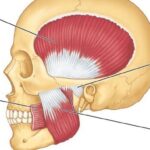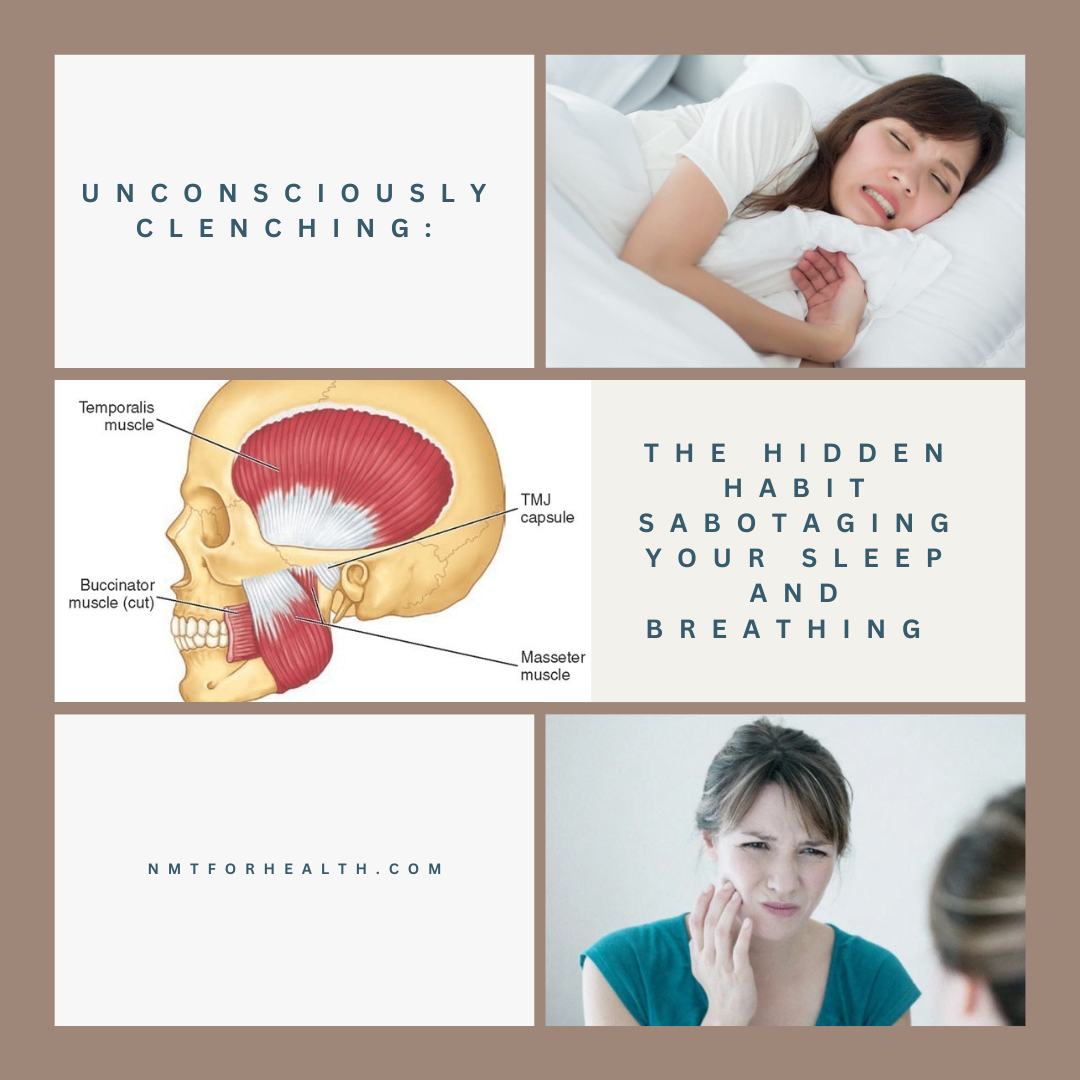Are you experiencing jaw pain, headaches, or difficulty sleeping due to jaw clenching at night? You’re not alone. Jaw clenching, also known as bruxism, is a common condition that can have far-reaching effects on your temporomandibular joint (TMJ), nervous system, and breathing. In this article, we’ll explore the causes and consequences of jaw clenching and discuss effective strategies for finding relief.
 The Mighty Masseter Muscle
The Mighty Masseter Muscle
The masseter muscle, responsible for jaw clenching, is one of the strongest muscles in the human body relative to its size. When this muscle is overworked due to constant clenching or grinding, it can send signals of tension to your nervous system, keeping your body in a heightened state of alertness. This chronic tension can lead to increased cortisol levels, poor sleep quality, and difficulty relaxing.
Is Masseter Hypertrophy Causing Your Jaw Pain and Discomfort?
If you’re experiencing a constantly sore jaw or noticing a change in your jawline’s appearance, you might be dealing with masseter hypertrophy. This condition occurs when the masseter muscle, which is responsible for chewing, becomes enlarged due to overuse or other factors.
Common causes of masseter hypertrophy include:
1. Teeth grinding or jaw clenching, often due to stress
2. Excessive gum chewing or consumption of hard foods
3. Genetic predisposition to a stronger or larger jawline
Symptoms of masseter hypertrophy may include:
– A noticeably square or asymmetrical jawline
– Persistent jaw pain or discomfort
– Tightness or tension in the jaw and neck muscles
– Clicking or popping sounds in the jaw joint (TMJ)
While masseter hypertrophy is not a recognized medical diagnosis, it can be a contributing factor to other jaw-related conditions, such as TMJ disorders or bruxism. If you suspect that you may have masseter hypertrophy, it’s important to consult with a dental professional or jaw specialist to determine the best course of action.
Treatment for masseter hypertrophy often involves addressing the underlying causes, such as managing stress, correcting bite alignment, or treating associated conditions like bruxism or TMJ disorders. While cosmetic treatments like Botox injections can temporarily reduce the appearance of an enlarged masseter muscle, they do not address the root cause of the issue.
If you’re struggling with jaw pain or discomfort related to masseter hypertrophy, remember that you don’t have to suffer in silence. Reaching out to a qualified professional can help you find relief and improve your overall quality of life. With the right treatment plan and support, you can overcome the challenges of masseter hypertrophy and enjoy a healthier, happier jaw.
The TMJ Connection
Jaw clenching puts excessive pressure on the TMJ, the joint that connects your jawbone to your skull. Over time, this can lead to TMJ disorders, characterized by pain, inflammation, and dysfunction in the joint. Common symptoms of TMJ disorders include jaw pain, clicking or popping sounds, limited jaw movement, headaches, and neck and shoulder pain.
According to a study by Drs. Glaros, Hanson, and Ryen, published in the Journal of Oral Rehabilitation, “Individuals with TMD [temporomandibular disorders] reported significantly more stress, anxiety, and depression than those without TMD.” This highlights the strong connection between emotional stress and jaw clenching.
Breathing and Sinus Health
Chronic jaw tension can also affect your breathing and sinus health. Tight jaw muscles can restrict airflow, leading to shallow breathing, sleep apnea, and sinus pressure. This can cause discomfort, headaches, and an increased risk of sinusitis. A study published in the Journal of Oral Rehabilitation found that individuals with bruxism reported higher levels of stress and poorer sleep quality compared to those without the condition.
Dr. Vladimir Janda, a renowned researcher in the field of musculoskeletal pain, emphasized the importance of proper breathing patterns in maintaining overall health. He stated, “Dysfunctional breathing patterns can perpetuate chronic muscle tension and pain, creating a vicious cycle that can be difficult to break without targeted interventions.”
Traditional Treatments: Addressing Symptoms, Not Causes
Many people turn to night guards or Botox injections to manage their jaw clenching. While these approaches can provide temporary relief, they don’t address the underlying cause of the issue. Bite guards protect your teeth from wear and tear but don’t realign your bite or stop the clenching. Similarly, Botox injections can temporarily relax the masseter muscle but don’t retrain your muscles or support long-term health.
TMJ Therapy: A Holistic Approach
TMJ therapy takes a holistic approach to address the root causes of jaw clenching. By combining neuromuscular therapy, manual techniques, and specialized tools like the bite wheel, TMJ therapy works with the nervous system to restore proper muscle function and alignment. This gentle, non-invasive approach supports the restoration of proper muscle function and balance, helping you achieve long-lasting relief without relying on external aids.
As Dr. Janda noted, “The key to long-term relief from chronic pain is to address the underlying dysfunction, not just the symptoms. By retraining the nervous system and promoting proper muscle balance, we can break the cycle of pain and tension.”
Self-Care Strategies for Jaw Clenching
In addition to seeking professional help, there are several self-care strategies you can incorporate into your daily routine to manage jaw clenching:
1. Practice relaxation techniques such as deep breathing, meditation, or progressive muscle relaxation to reduce stress and tension.
2. Use a bite wheel in conjunction with habit stacking, such as while brushing your teeth or before going to bed, to help retrain your jaw muscles.
3. Maintain good posture to reduce strain on your jaw, neck, and shoulders.
4. Apply heat or cold therapy to alleviate pain and relax tense muscles.
5. Avoid chewing gum or eating hard, crunchy foods that can exacerbate jaw clenching.
Finding Relief from Jaw Clenching
If you’re experiencing symptoms of jaw clenching or TMJ disorders, it’s essential to take action for your long-term health. By addressing the root causes of your condition through a holistic approach like TMJ therapy and incorporating self-care strategies into your daily routine, you can find lasting relief and improve your overall well-being.
Remember, everyone’s journey to relief is unique. While some may experience immediate improvements, others may require more time and consistent effort. Be patient with yourself and celebrate the small victories along the way. With dedication and the right support, you can break free from the cycle of jaw clenching and enjoy a healthier, more comfortable life.
Mara Nicandro NMT
Wicker Park Studio
maranicandronmtappointments.com

